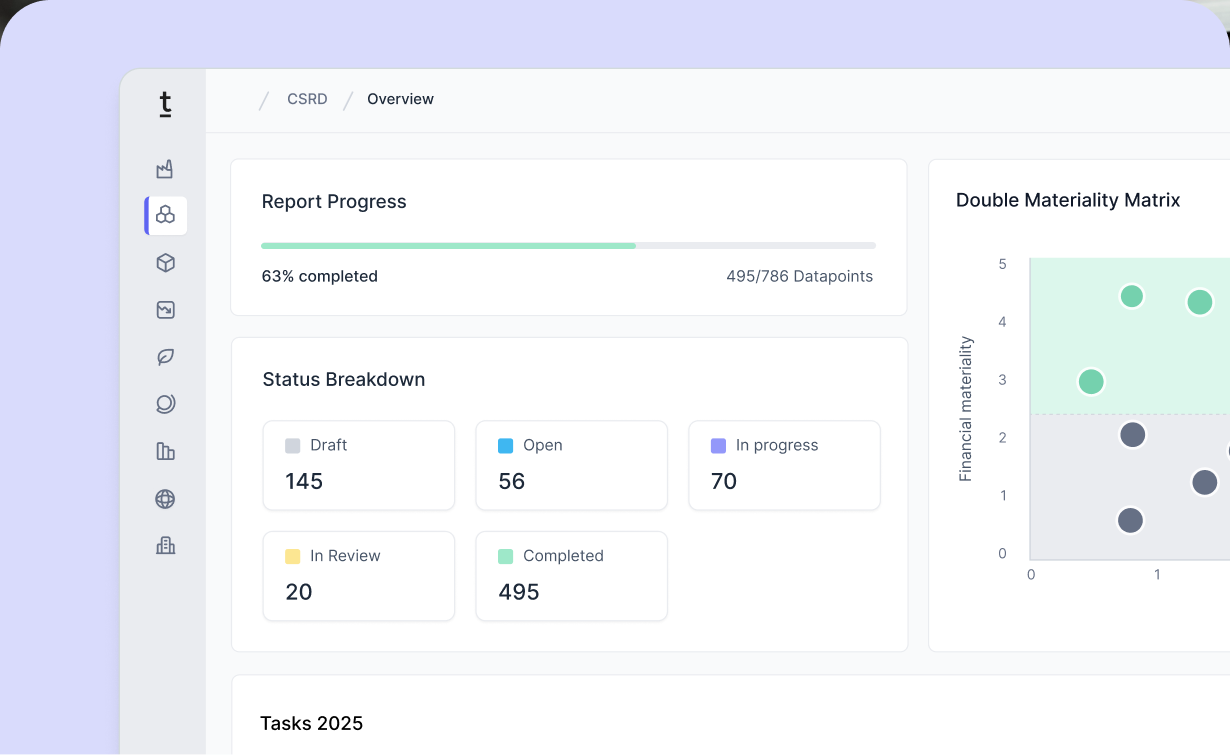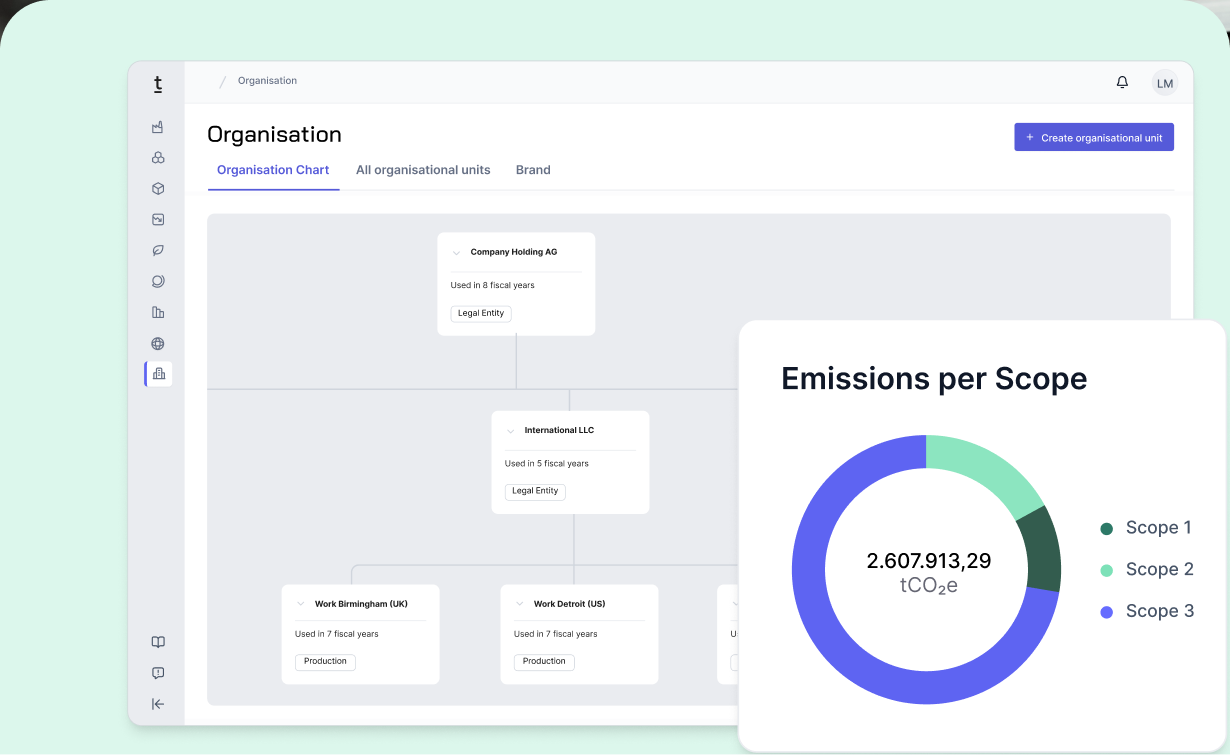Corporate Sustainability Reporting Directive (CSRD) — The most important facts at a glance

Definition & Background
With the introduction of the NFRD (Non-Financial Reporting Directive) in 2014, the European Union took the fundamental step towards creating transparency with regard to CO₂ emissions in the supply chains of large companies. In order to meet the 2019 European Green Deal target of reducing 55% of CO₂ emissions within the EU by 2030 compared to 1990 levels, the EU decided to comprehensively expand the measurement and tracking of sustainability aspects (including CO₂ emissions). This goal is being pursued through the Corporate Sustainability Reporting Directive (CSRD). It aims to close existing gaps in the NFRD and expand the group of affected companies from around 11,600 to around 50,000.
What is the CSRD?
The CSRD provides clear instructions on what and how to report in order to achieve compliance with the 12 European Sustainability Reporting Standards (ESRS) published on July 31, 2023. It extends the scope and reporting requirements of the existing directive on the reporting of non-financial information.
The introduction of the CSRD represents a significant step towards corporate responsibility and transparency in carbon accounting, as it requires major European economic actors and carbon emitters to provide detailed and traceable information on emissions at company level.
Why was the CSRD introduced?
Providing non-financial information in a transparent form to investors and civil society organizations is of great importance for affected companies, especially in the context of the EU taxonomy. This information enables stakeholders to better understand a company's sustainability performance and to align their investment decisions accordingly.
Improved consideration of sustainability risks and impacts, as well as reducing the burden on companies related to non-financial reporting, can be achieved through a double materiality assessment according to CSRD. This analysis considers both financial and non-financial materiality and enables companies to identify and report on their most important sustainability issues. Through a double materiality assessment, companies can ensure that their non-financial reporting provides relevant and meaningful information that meets the needs of their stakeholders
Which companies are affected by the CSRD?
Direct
Companies that meet two of the following three criteria are required to report under the CSRD:
- More than 250 employees
- More than €50M turnover
- More than €25M balance sheet
In addition, listed SMEs and non-EU companies that either have subsidiaries or securities in the EU and have generated a net turnover of more than €150 million in the last two consecutive financial years must also comply with the CSRD requirements.
Following the implementation of the Omnibus Initiative, this may potentially change (see section: EU Commission’s Omnibus Proposal from 26.02.2025).
Indirect
The CSRD sets in motion a "snowball effect" that must be taken into account when determining the scope of the companies affected. For example, original equipment manufacturers (OEMs) may be directly obliged to provide information on their emissions in the supply chain. This may mean that companies that were not previously obliged to report will also have to provide sustainability indicators such as the product carbon footprint (PCF) or information on the energy mix. This networked reporting structure means that reporting obligations have a cascading effect along the supply chain and ultimately contribute to a more comprehensive understanding of CO₂ emissions and sustainability performance.
When are companies affected by the CSRD?
- January 2024: Companies that are already subject to reporting requirements under the NFRD (Non-Financial Reporting Directive). For German companies, the NFRD still applies for the 2024 financial year, as the CSRD has not yet been implemented in Germany (expected by the end of 2024).
- January 2025: EU companies that are not capital market-oriented and meet at least two of the following criteria:
- More than 250 employees
- More than €50M turnover
- More than €25M balance sheet
- January 2026: EU companies that are capital market-oriented and fulfill at least two of the following criteria:
- More than 10 employees
- More than €0.9M turnover
- More than €0.45M balance sheet
- January 2028: EU companies that are neither capital market-oriented nor meet the above criteria, but have an annual turnover in the EU of more than 150 million euros and subsidiaries with a turnover of more than 40 million euros.
Potential Changes Under the EU Commission’s Omnibus Proposal (26.02.2025)
If implemented, the groups of affected companies would change significantly:
- January 2024: Publicly listed EU companies with:
- > 1,000 employees
- Either > €50M turnover or > €25M balance sheet
- January 2027: Large, private EU companies with:
- > 1,000 employees
- either > €50M turnover or > €25M balance sheet
- January 2028: Non-EU companies with:
- > €450M turnover in the EU or
- a subsidiary with > €50M turnover
- The CSRD reporting requirement would be eliminated for:
- Publicly listed SMEs
- Private EU companies with fewer than 1,000 employees
How do companies have to report?
From 2025, qualifying companies will be required to publish their sustainability data for the previous year, i.e. for 2024, in a standardized digital format. This disclosure will be subject to a review after submission to ensure compliance with the regulations, and an important part of this reporting is the disclosure of Scope 3 emissions, which covers all indirect emissions generated in the course of business activities along the entire value chain. This includes emissions caused by business travel or the disposal of company waste. Regular reporting must be carried out annually and is an essential part of the management report in the financial report. It is essential that the reporting is clearly structured and complies with the disclosure requirements defined by EFRAG. The specific thematic requirements must be reported in accordance with the relevant standards. Other requirements can be found in the overarching ESRS 2 standard, which creates a comprehensive and transparent picture of a company's sustainability efforts that meets regulatory requirements and the increasing expectations of stakeholders for transparency and accountability.
Consequences in case of violation
- Sanctions and penalties
The EU member states are responsible for determining the sanctions, which will be set by the end of 2024, while the CSRD is transposed into national law. In Germany, companies can be punished with fines or up to three years' imprisonment for false or incomplete reports in accordance with Section 331 (1) No. 1 or 2 HGB. Fines can also be imposed in accordance with Section 334 (1) No. 3 or 4 HGB. In the EU, additional measures and consequences have been adopted as part of the Corporate Sustainability Due Diligence Directive (CSDDD).
- Damage to reputation
Violation of CSRD can lead to loss of trust and immense reputational damage with long-term business implications
- Competitive disadvantages
Companies that do not comply with sustainability standards risk losing customers and investors. This can lead to a loss of sales and a deterioration in their competitive position. In addition, non-compliance with the CSRD can lead to a company being excluded from public tenders in accordance with Section 289 et seq. HGB from public tenders.
How to prepare for the CSRD requirements
Many medium-sized industrial companies face major challenges when it comes to mandatory carbon accounting reporting for the year 2025. It is therefore recommended to start collecting data at an early stage and to use 2024 as a test phase and, in view of the extensive catalog of CSRD requirements, it is also advisable for companies to consider using appropriate software. Tanso helps companies meet the requirements of the CSRD and achieve sustainability goals through auditable and integrated ESRS reporting to the highest standards. Our focus on data-intensive categories (e.g. corporate carbon footprint) enables Tanso not only to report in accordance with standards, but also to actively manage and optimize ESG performance. Find out here how the software can also support your organization in setting up a robust and audit-proof standard process with an audit trail.
















































.avif)







.jpg)
.jpg)




















-p-800.webp.avif)
-min-p-800.webp.avif)






-p-800.webp.avif)

